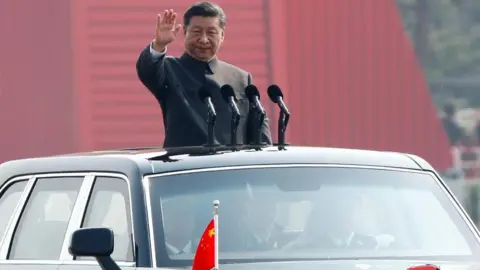Through Frank Gardner, security correspondent
 reuters
reutersApparently, this time the NATO summit in Washington has affected the agricultural land. The alliance could demonstrate that it is bigger and more powerful than ever, reduce its military aid to Ukraine and send a strong message to China asking it to stop covertly supporting Russia’s conflict over Kiev. sent it.
Sir Keir Starmer’s antiquated executive has a chance to position itself as a lynchpin within the transatlantic alliance at a time when a lack of political certainty looms large in the white spaces and in far-flung parts of Europe.
Back in Britain, the priorities for this ancient government are urgent: the financial system, housing, immigration, the NHS, to name but a few.
But unwanted blackmails and situations can become addictive and scare you by constantly thwarting even the most skillful plans.
So what could be behind this ancient UK executive’s time monitor?
conflict in lebanon
Deny the surprise right here, it’s on everyone’s radar. However, that doesn’t make it any less bad for Lebanon, Israel, and the entire Middle East.
“The possibility of a large-scale Israeli invasion of Lebanon this summer should be at the top of the new government’s geopolitical risk register.”
This is according to school teacher Malcolm Chalmers, deputy director-general of the Royal United Services and Products Institute (RUSI), a Whitehall think tank.
With the war in Gaza continuing and Houthi attacks on Purple Sea transportation, Professor Chalmers believes “we may be entering a period of sustained multi-front war in the region, for which neither Israel nor its “Western partners will be ready.”
Since the Hamas-led attack on southern Israel on 7 October, there were fears that Israel’s next military operation in Gaza could escalate into a full-scale regional war across the borders.
Israel’s northern border with Lebanon is the place where such conflicts are most likely to erupt.
Daily gunfire along the border between Israel Defense Forces (IDF) and Hezbollah, the Iranian-backed Shia armed forces, has already left scores of people dead, especially in Lebanon.
More than 60,000 Israelis were forced to leave their homes and livelihoods in the north and crowd into the Lebanese side for a better alternative.
The Israeli government is pushing its forces north of Lebanon’s Litani River to “deal with” Hezbollah, from where they will have little chance of sending rockets into Israel.
IDF Lieutenant Colonel Nadav Shoshani says, “We don’t want to go to war, but I don’t think any country can accept 60,000 of its citizens displaced. The situation must end. We would like that to happen.” “A diplomatic solution, but Israeli patience is running out.”
 reuters
reutersAll sides have good reasons not to fight.
Lebanon’s financial system is already fragile. It has recovered little from the 2006 conflict with Israel and a renewed full-scale war would have a tragic impact on the country’s infrastructure and its overcrowding.
Hezbollah, for its part, would likely respond to a major Israeli strike and offensive with a massive and sustained missile, drone, and rocket barrage that could potentially crush Israel’s Iron Dome air defenses.
Nowhere in Israel has matched its success.
At this stage, US forces located offshore could tactically join Israel’s side. After which the question arises what Iran will do.
It has a large stockpile of ballistic missiles, in addition to a network of proxy militias in Iraq, Yemen and Syria, which it can mobilize to intensify its attacks on Israel.
One way to defuse the heat of tensions on the Israel-Lebanon border might be to end the war in Gaza. But nine months and a gruesome death later, a long-term recreation is still not complete.
Iran will get the bomb!
The Iran nuclear proposal, the Joint Comprehensive Plan of Action (JCPOA), designed to contain and track Iran’s nuclear program, was the Obama administration’s biggest foreign policy success in 2015.
However this has long been broken.
An hour later, incoming President Trump unilaterally withdrew from it, barring Iran from abiding by its laws.
Buried deep beneath vast mountains, apparently beyond the reach of even the most powerful bunker-busting bombs, Iran’s nuclear centrifuges were spinning rapidly, enriching uranium well beyond the 20% required for nonviolent civilian purposes. Had been. (The atomic bomb requires highly enriched uranium.)
Formally, Iran insists that its nuclear program is entirely non-violent, that it is solely for power generation.
However, Israeli and Western experts have expressed fear that Iran has a secret program to reach “breakout capability”: reaching a point where it takes radical action to produce a nuclear bomb, but essentially that. Doesn’t complete it.
It will no longer escape Iran’s realization that North Korea, an independent, international pariah, is often amassing an arsenal of nuclear weapons and a way to deliver them, a huge deterrent to any potential aggressor.
If Iran gets the bomb, it is almost inevitable that its regional rival Saudi Arabia will move to acquire it as well. Türkiye will do the same and so will Egypt.
And suddenly there was a nuclear finger race around the Middle East.
Russia’s victory in Ukraine
 reuters
reutersIt will depend on what you define as a “win”.
At its peak, it overpowered Russian forces defending Ukraine and seized what remained of the country, including the capital Kiev, ousting the pro-Western government of President Volodymyr Zelensky and installing a Moscow-appointed puppet regime.
In fact, this was the unedited plan behind a full-scale Russian invasion of February 2022, a plan that failed spectacularly.
This situation is not going away concept recently.
However, Russia no longer wants to occupy all of Ukraine so as to claim any broad “victory”, something it would likely use to justify to its hordes the astronomically top casualties it is suffering in this war. Can provide for.
Russia already occupies about 18% of Ukraine and, in the east, its forces are gradually taking over the grasslands.
Even if additional Western guns are on their way, Ukraine faces a severe shortage of manpower. Its soldiers, fighting bravely, constantly outnumbered and outgunned, are exhausted.
The Russian commanders, who appear to care little for the lives of their men, are stacked on their side. Russia’s entire financial system has been put on conflict footing, with about 40% of state funds now devoted to defense.
President Vladimir Putin, whose contemporary “conditions for peace talks” amounted to a general capitulation through Ukraine, believes he has kept his word. He knows that there is every possibility that his spoiled friend Donald Trump will be back in the White Space within a few months and Western support for Ukraine will begin to crumble.
Russia wants to directly hold on to what it has already achieved, and to deny Ukraine the possibility of becoming a member of NATO and the EU, so as to claim a partisan victory in that conflict. Which he portrayed as a struggle for Russian survival.
china takes taiwan
Again, this could take a fair amount of threats.
Chinese President Xi Jinping and his officials have said on various occasions that they will “return Taiwan’s self-ruled island independence to the motherland” by force if necessary.
Taiwan no longer wants to be dominated by Beijing through the Chinese Communist Party (CCP).
However, China considers Taiwan a rebel province and wants to see it tactically “reunified” ahead of the centenary of the CCP’s launch in 2049.
The United States has imposed “strategic ambiguity” on Taiwan.
Helping to annex Taiwan is a legal certainty, but Washington wants to keep China from guessing whether it means sending U.S. troops to fight a Chinese invasion.
 reuters
reutersChina would virtually unquestioningly take the position of not attacking Taiwan.
This can be extremely costly in both blood and donations. Ideally, Beijing would like Taiwan to abandon its goals of full self-rule and voluntarily assume dominance over the mainland.
However, as of late that seems not to be happening – the people of Taiwan have watched in horror as freedoms are being crushed in Hong Kong – Beijing has another option up its sleeve.
If and when he decides to visit Taiwan, he is more likely to struggle to seal it off from the outside world, making the moment unbearable for its voters, although at least to avoid a catastrophic situation. There will be bloodshed. Conflict with America.
Is Taiwan the topic? it happens.
This is much more than the huge rules protecting a democratic best friend on the alternative side of the field.
Taiwan produces more than 90% of the region’s top-end microchips, tiny pieces of technology that power almost all of the energy that runs our modern lives.
The US-China conflict over Taiwan would have devastating effects on the global financial system that would dwarf the conflict in Ukraine.
Have any great information?
Not at all, but there are some moderating elements here.
Trade is paramount for China. Beijing’s progressive plans to expel US forces from the Western Pacific and dominate the entire region may be undermined by devastating sanctions and its reluctance to cause a world trade conflict.
In Ukraine, President Putin is making slow, incremental territorial gains, but the casualties have been much worse.
When the Red Army took over Afghanistan in the eighties, about 15,000 people were killed over a decade, sparking domestic protests and the demise of the Soviet Union.
In Ukraine, with only a quarter of that presence, Russia has suffered many times that death toll. To put it mildly, the opposition has been restricted – the Kremlin largely controls what information Russians see – although the longer this conflict drags on, the more likely it is that Russian society will sooner or later turn to its fellow voters. Was adamant on the increasing choice of.
In Europe, where concerns over Trump’s historic policy have grown a month after he became president, an ancient security pact is being drafted under the leadership of Britain.
As the US presidential elections approach in November, conflict planning is being intensified to mitigate any potential problems for the continent’s security.
Discover more from news2source
Subscribe to get the latest posts sent to your email.





